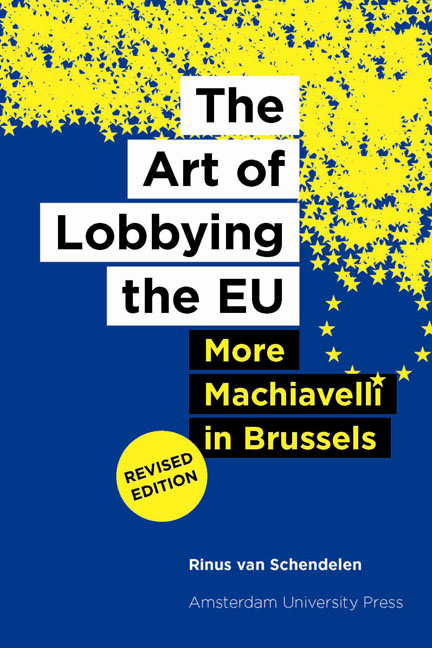Book contents
- Frontmatter
- Dedication
- Contents
- Detailed Contents
- Special Preface to the Fourth Edition: Ten Years’ Anniversary of this Book
- List of Figures
- List of Best Websites
- List of Abbreviations
- 1 The Europeanization of Public Affairs
- 2 The Playing-Field: EU Common Decision-Making
- 3 Pushing the Buttons of ‘Brussels’
- 4 Getting Grip on an EU Arena
- 5 Managing the Home Front
- 6 Managing the EU Fieldwork
- 7 The Limits of EU Public Affairs Management
- 8 Public Affairs, Lobbying and EU Democracy
- References
- Index
8 - Public Affairs, Lobbying and EU Democracy
Published online by Cambridge University Press: 10 December 2020
- Frontmatter
- Dedication
- Contents
- Detailed Contents
- Special Preface to the Fourth Edition: Ten Years’ Anniversary of this Book
- List of Figures
- List of Best Websites
- List of Abbreviations
- 1 The Europeanization of Public Affairs
- 2 The Playing-Field: EU Common Decision-Making
- 3 Pushing the Buttons of ‘Brussels’
- 4 Getting Grip on an EU Arena
- 5 Managing the Home Front
- 6 Managing the EU Fieldwork
- 7 The Limits of EU Public Affairs Management
- 8 Public Affairs, Lobbying and EU Democracy
- References
- Index
Summary
It is a good thing that anybody anxious to serve the public is able to propose a law, in regard to which everyone can speak either in favour of it or against it, prior to a decision being reached. A civilian is more prudent, more stable and a better judge than a prince. What do Machiavelli's views on democracy (Discorsi I-18, I-58) imply for the current EU?
I Democracy as a Criterion
The views of Machiavelli above may be most surprising to many people but not to the informed few [McCormick, 2011]. In his private role of citizen the man from Florence was always most critical about rulers in the past and present, while in his public role of civil servant he advised his ruler, Lorenzo dei Medici, ‘how to survive’ in domestic and foreign affairs. His answer, given above, was that the ruler should institutionalize the greater qualities of the people by participatory forms of democracy, as otherwise he shall lose position at his home front and thus in foreign affairs too. If Machiavelli could have foreseen the future, he would have praised the phenomenon of countless active interest groups at EU level. From his side he would be surprised to hear that lobbying in the EU is nowadays often criticized for its ‘damaging effects’ on the democratic functioning of the EU. At the 1992 EP hearings on lobbying three lasting criticisms were launched. Firstly, industrial MNCs were said to create, by their activism and dominance, imbalances of decision-making, to the disadvantage of weaker groups such as workers, consumers and small enterprises. Secondly, much lobbying was said to take place behind closed doors, thereby creating a lack of transparency that frustrates competitors, mass media and even officials. Thirdly, many of those who engage in lobbying were accused of abusive and immoral practises, such as stealing documents, blackmail and bribery, which should be forbidden. Today, particularly in countries recently discovering the phenomenon of lobbying the EU, many mass media voice strong criticisms and fears, as has happened in Britain in the 1980s, Scandinavia in the 1990s, Germany in the early 2000s and in the Central and Eastern European Countries (CEECs) recently.
- Type
- Chapter
- Information
- The Art of Lobbying the EUMore Machiavelli in Brussels (Revised Edition), pp. 325 - 362Publisher: Amsterdam University PressPrint publication year: 2013



